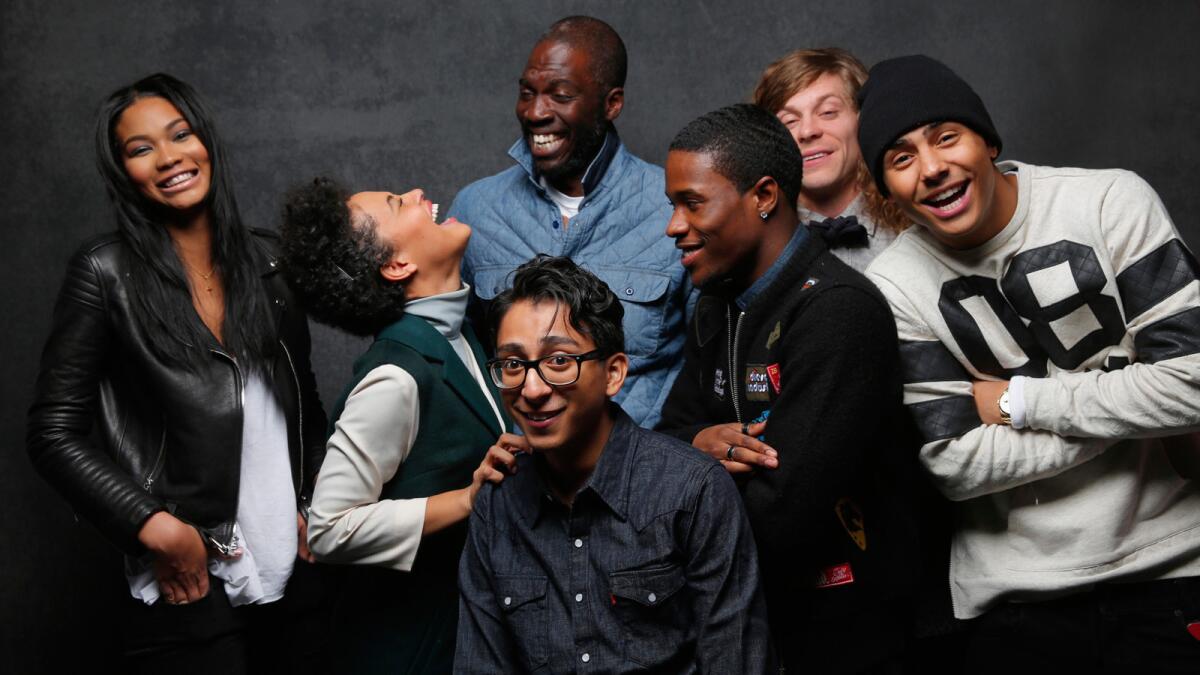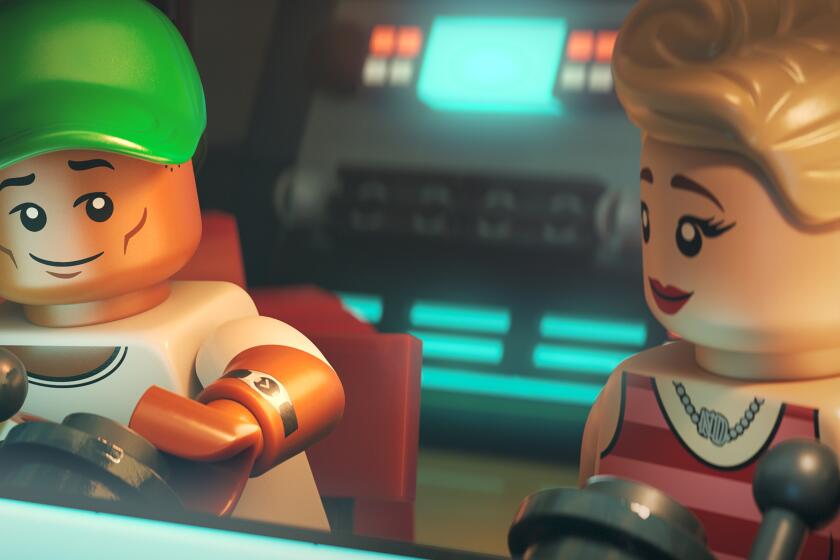The comedy-drama ‘Dope’ defies ‘black film’ expectations

Chanel Iman, left, Kiersey Clemons, Tony Revolori, director Rick Famuyiwa (rear), Shameik Moore, Blake Anderson and Quincy Brown from the movie “Dope” at the Sundance Film Festival on Jan. 24, 2015. (For the record: An earlier version of this caption misidentified the placement of director Rick Famuyiwa.)
Drug dealers or dorks? Hip-hop or punk rock? Harvard or the ‘hood?
There’s no need to chose sides in “Dope,” a comedy-drama that takes pleasure in redefining what it means to be young, black and growing up in a tough part of town.
Set in present-day Inglewood, nerdy high school senior Malcolm (Shameik Moore) and his equally nonpopular friends Jib (Tony Revolori) and Diggy (Kiersey Clemons) aren’t like most of their classmates. They openly discuss their Ivy League aspirations, play in a pop-punk band and have a fixation with 1990s pop culture that manifests itself in unfashionable flattops and baggy TLC-wear.
INDIE FOCUS: Sign up for our weekly movies newsletter
But when they accidentally cross paths with neighborhood drug dealer Dom (rapper A$AP Rocky), the naive trio is forced to rely on their geek smarts to navigate a world of crime, gangs, profiling cops and corruption. In the process they come to find who they truly are, or at least what they want out of life, and it’s of course far more complex than a Tupac song.
Part “Ferris Bueller’s Day Off,” part “Boyz n the Hood,” the film doesn’t fit neatly into any particular marketing niche — and that was always director and writer Rick Famuyiwa’s intention.
“It’s not a ‘hood film or romantic comedy or Tyler Perry,” says Famuyiwa, 41, the son of Nigerian immigrants who grew up in Inglewood. “It’s like there’s only two or three things black films can be, and it’s none of those.”
Not surprisingly, Hollywood didn’t get it.
After unsuccessfully shopping his screenplay around various studios, Famuyiwa found backers from the music world, including Pharrell Williams who became executive producer and Sean Combs (a.k.a. Puffy), co-executive producer. “Dope” ended up being made as an independent film with the help of producers Forest Whitaker and Nina Bongiovi, who had just finished producing “Fruitvale Station.”
Once “Dope” premiered to enthusiastic audiences at the Sundance Film Festival in January, it was bought for a reported $7 million by Open Road Films and Sony Pictures Worldwide. It arrives in theaters June 19.
It joins a small wave of films, TV and books that are playing with and testing tired notions of race, especially blackness—”Dear White People,” “Blackish,” “The Sellout,” to name a few.
“Dope” co-stars Zoe Kravitz as the gang-tattooed love interest and Rick Fox as a suspiciously smooth banker. L.A. rappers such as Casey Veggies populate the film’s large cast. Whitaker narrates “Dope,” and Williams composed four songs for Malcolm’s band.
“The ‘90s were a great decade for music, not just hip-hop,” says Williams. “The era is defined by many unique voices, it was the perfect soundtrack to represent the spirit of the movie. In creating the songs for Awreeoh [Malcolm’s band], I was inspired by the angst of these characters, how they see the world, their dreams and aspirations.”
“Dope” is a funny and unpredictable ride through Malcolm’s rough neighborhood, known as the Bottoms. His journey is fueled by teen lust, miscommunication and scenarios so absurd they could happen only in his corner of L.A. “Everything that happens in the [film] world seems to happen to white suburban people — alien invasions, house hauntings, whatever,” Famuyiwa says with a laugh. “When people see that L.A., they’re only seeing the L.A. of Judd Apatow.”
The film is also meant to upend preconceptions about coming-of-age films and race — but done with a light touch.
“You might go into ‘Dope’ feeling you already know what this movie is because, all right, there’s kids, they’re from Inglewood, oh, it’s drugs,” says Famuyiwa on the phone from Atlanta, where he’s shooting his very different next project, the story of Anita Hill and Clarence Thomas for HBO.
“But actually the kid who’s the drug dealer is the white kid from Brentwood, and the black kids from the ‘hood go to him to get help because he’s the expert on [selling] drugs,” he says. “I wanted to take everything and subvert your expectations.”
Unorthodox paths
The goal of subversion interested Whitaker and Williams from the start. Like Famuyiwa, both self-identify as misfits, and both cut their own unorthodox paths in their respective fields.
“I was a loner,” says the Oscar-winning Whitaker (“Last King of Scotland”), referring to his childhood growing up in South LA. “I was really isolated and to myself, almost like a hermit. In that respect I can relate to these characters, and the struggle to feel like they fit inside of a world that maybe seems oblivious to the way their brain or heart is constructed.”
Before Williams became involved in “Dope” or launched his indelible song “Happy,” he was part of an eclectic music duo called N.E.R.D. Needless to say he also related to Malcolm and his gang.
“We weren’t the toughest guys in the world in high school, but we also weren’t afraid,” said Williams in a statement about the film. “And we felt like being intelligent was not necessarily a negative thing. Rick brilliantly sews that together in DOPE.”
Famuyiwa’s earlier projects include “The Wood,” another coming-of-age story set in Inglewood that he made straight out of USC film school. He also wrote the screenplays for several comedies and dramas geared to African American audiences, such as “Brown Sugar” and “Our Family Wedding.”
But after a couple of decades dealing with risk-averse studios and film execs, eventually Famuyiwa was ready to break loose from cinematic conventions.
“I was fortunate to write pretty much a year out of film school and start making movies in the Hollywood studio system,” says Famuyiwa, still based in L.A. “But with each progressive film it became more frustrating not being able to speak and say things I wanted to say. I wanted to rediscover something artistically that I felt I was losing and say things I never really had a chance to say.”
Famuyiwa describes “Dope” as “Risky Business” for the social-media generation. Bitcoin, YouTube, iPhone apps, texting, streaming and the dark Web are major players here. Technology is a large part of what sets these kids apart from the Inglewood Famuyiwa grew up in.
“Everyone would assume these kids from Inglewood would form a hip-hop group, but I thought Malcolm would be into so many different [genres] that they would form a band that played everything,” he says. “Because of technology, there’s no longer the social shaming that goes on if you’re a black kid walking into a record store to buy Nirvana.
“Dope’s” teens, however, are still teens — obnoxious, annoying, fast-food obsessed and occasionally stupid.
To keep the characters fallible, Famuyiwa had to fight his own instincts. That’s because he was writing “Dope” around the time Trayvon Martin was shot and killed by George Zimmerman. The way Martin’s character was picked apart by the media and in the courtroom affected how Famuyiwa would portray Malcolm and his friends
“There’s pressure as a filmmaker to combat that [narrative] and try and show how great these teens are by polishing off all the hard edges,” says Famuyiwa, who has a young son. “But I wanted these kids to be as raw and emotional and young and mistake-prone as all kids are, because at the end of the day they are just kids. They have value and potential.
“Sometimes that potential gets nurtured if you live in a place like Brentwood and discouraged and unseen if you live in Inglewood,” he says. “But at the end of the day, the lottery of birth shouldn’t determine your value to the world.”
More to Read
Only good movies
Get the Indie Focus newsletter, Mark Olsen's weekly guide to the world of cinema.
You may occasionally receive promotional content from the Los Angeles Times.











